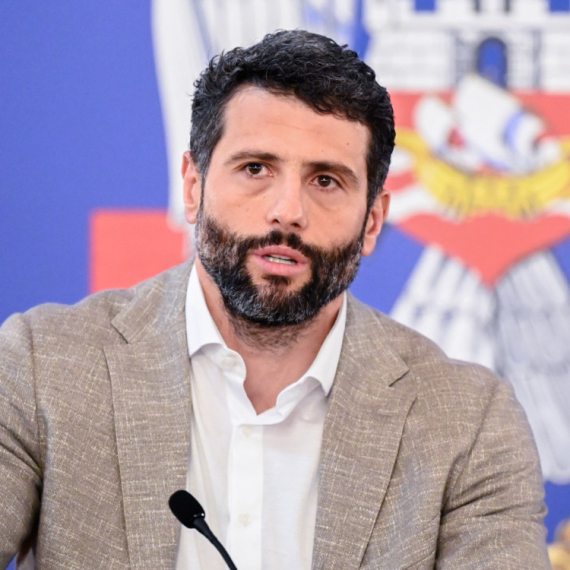Karadžić testifies in Krajišnik appeal
Radovan Karadžić has testified before the Hague Tribunal that Momčilo Krajišnik did not take any key decisions during the war in Bosnia-Herzegovina.
Wednesday, 05.11.2008.
16:55

Radovan Karadzic has testified before the Hague Tribunal that Momcilo Krajisnik did not take any key decisions during the war in Bosnia-Herzegovina. The former president of the Republic of Srpska (RS), who himself is accused of genocide against non-Serbs in Bosnia-Herzegovina, testified in defense of Krajisnik, who has already been sentenced to 27 years in prison for crimes against Bosnian Muslims and Croats in 1992. Karadzic testifies in Krajisnik appeal He was the RS parliamentary speaker at the time. In line with the Tribunal Appeals Chamber’s decision, Krajisnik, who is defending himself, did not question Karadzic in court, but read out a written statement from Karadzic, whose authenticity the witness confirmed to the judges. “Mr. Karadzic, can you confirm that your statement is true and would you give the same statement in court?” Krajisnik asked. “Yes, absolutely.” Karadzic said. He was later cross-examined by the prosecution. Karadzic’s stated that he and Krajisnik had not “run RS as their personal fiefdom,” as the prosecution contends. “Krajisnik did not get involved in the government, beyond his role in the parliament, and he did not have any say in military operations…I never saw Krajisnik as my own private prime minister. Krajisnik was never the number two man in the RS,” the former Bosnian Serb leader stated. Karadzic said that “the ethnic separation of Muslims was never Krajisnik’s obsession, nor the policy of the Serb leadership.” When the war broke out, Krajisnik “did not have any control and was not part of the military chain of command,” he said. As concerns the six strategic goals that the RS parliament supported in May 1992—which included separating Serbs from the other two ethnicities, the partition of Sarajevo, and “removing the Drina as a border”—Karadzic claimed that they expressed a “political position”, but that the parliament had never adopted any of them. Karadzic stated that Krajisnik had never been a member of the “expanded RS presidency,” because that body had never existed. Krajisnik merely informed the members of the RS Presidency—Karadzic, Biljana Plavsic and Nikola Koljevic—of the work of the parliament when asked. The speaker’s job was to lead the parliamentary sessions in a democratic atmosphere, Karadzic said, adding that he had not had any influence among MPs, nor was he one of the leaders of the Serb Democratic Party (SDS). Karadzic said that Krajisnik had not have any influence on the work of the military or police in the RS either. He said that Krajisnik “did not give any orders to RS military leaders.” The former Bosnian Serb leader also confirmed that Ratko Mladic had assumed the leadership of the military on his recommendation after other military officers recommended him. According to Karadzic, Krajisnik was not authorized to open any investigations on war crimes, nor were the Interior Ministry or military obliged to report to him. Karadzic was then questioned by Krajisnik’s legal counsel American lawyer Nathan Dershowitz, after the prosecution finished its questioning. Karadzic’s attorney Peter Robinson was also in attendance. On October 17, the appeals chamber approved Krajisnik’s motion for the former RS president to be allowed to testify in his appeal. Even though the appeal had already ended in August, Krajisnik called on the Tribunal to allow him to call Karadzic as a witness once he was arrested, stating that he was one of the most important individuals in the case and that his testimony could have a significant bearing on the verdict. Krajisnik was sentenced to 27 years in jail for his role in murders and persecution based on political, racial and religious differences, and deportation and inhumane acts during the war in Bosnia-Herzegovina. He was acquitted of charges of genocide. Radovan Karadzic (FoNet, archive)
Karadžić testifies in Krajišnik appeal
He was the RS parliamentary speaker at the time.In line with the Tribunal Appeals Chamber’s decision, Krajišnik, who is defending himself, did not question Karadžić in court, but read out a written statement from Karadžić, whose authenticity the witness confirmed to the judges.
“Mr. Karadžić, can you confirm that your statement is true and would you give the same statement in court?” Krajišnik asked.
“Yes, absolutely.” Karadžić said.
He was later cross-examined by the prosecution.
Karadžić’s stated that he and Krajišnik had not “run RS as their personal fiefdom,” as the prosecution contends.
“Krajišnik did not get involved in the government, beyond his role in the parliament, and he did not have any say in military operations…I never saw Krajišnik as my own private prime minister. Krajišnik was never the number two man in the RS,” the former Bosnian Serb leader stated.
Karadžić said that “the ethnic separation of Muslims was never Krajišnik’s obsession, nor the policy of the Serb leadership.”
When the war broke out, Krajišnik “did not have any control and was not part of the military chain of command,” he said.
As concerns the six strategic goals that the RS parliament supported in May 1992—which included separating Serbs from the other two ethnicities, the partition of Sarajevo, and “removing the Drina as a border”—Karadžić claimed that they expressed a “political position”, but that the parliament had never adopted any of them.
Karadžić stated that Krajišnik had never been a member of the “expanded RS presidency,” because that body had never existed. Krajišnik merely informed the members of the RS Presidency—Karadžić, Biljana Plavšić and Nikola Koljević—of the work of the parliament when asked.
The speaker’s job was to lead the parliamentary sessions in a democratic atmosphere, Karadžić said, adding that he had not had any influence among MPs, nor was he one of the leaders of the Serb Democratic Party (SDS).
Karadžić said that Krajišnik had not have any influence on the work of the military or police in the RS either.
He said that Krajišnik “did not give any orders to RS military leaders.”
The former Bosnian Serb leader also confirmed that Ratko Mladić had assumed the leadership of the military on his recommendation after other military officers recommended him.
According to Karadžić, Krajišnik was not authorized to open any investigations on war crimes, nor were the Interior Ministry or military obliged to report to him.
Karadžić was then questioned by Krajišnik’s legal counsel American lawyer Nathan Dershowitz, after the prosecution finished its questioning.
Karadžić’s attorney Peter Robinson was also in attendance.
On October 17, the appeals chamber approved Krajišnik’s motion for the former RS president to be allowed to testify in his appeal.
Even though the appeal had already ended in August, Krajišnik called on the Tribunal to allow him to call Karadžić as a witness once he was arrested, stating that he was one of the most important individuals in the case and that his testimony could have a significant bearing on the verdict.
Krajišnik was sentenced to 27 years in jail for his role in murders and persecution based on political, racial and religious differences, and deportation and inhumane acts during the war in Bosnia-Herzegovina. He was acquitted of charges of genocide.


























Komentari 1
Pogledaj komentare